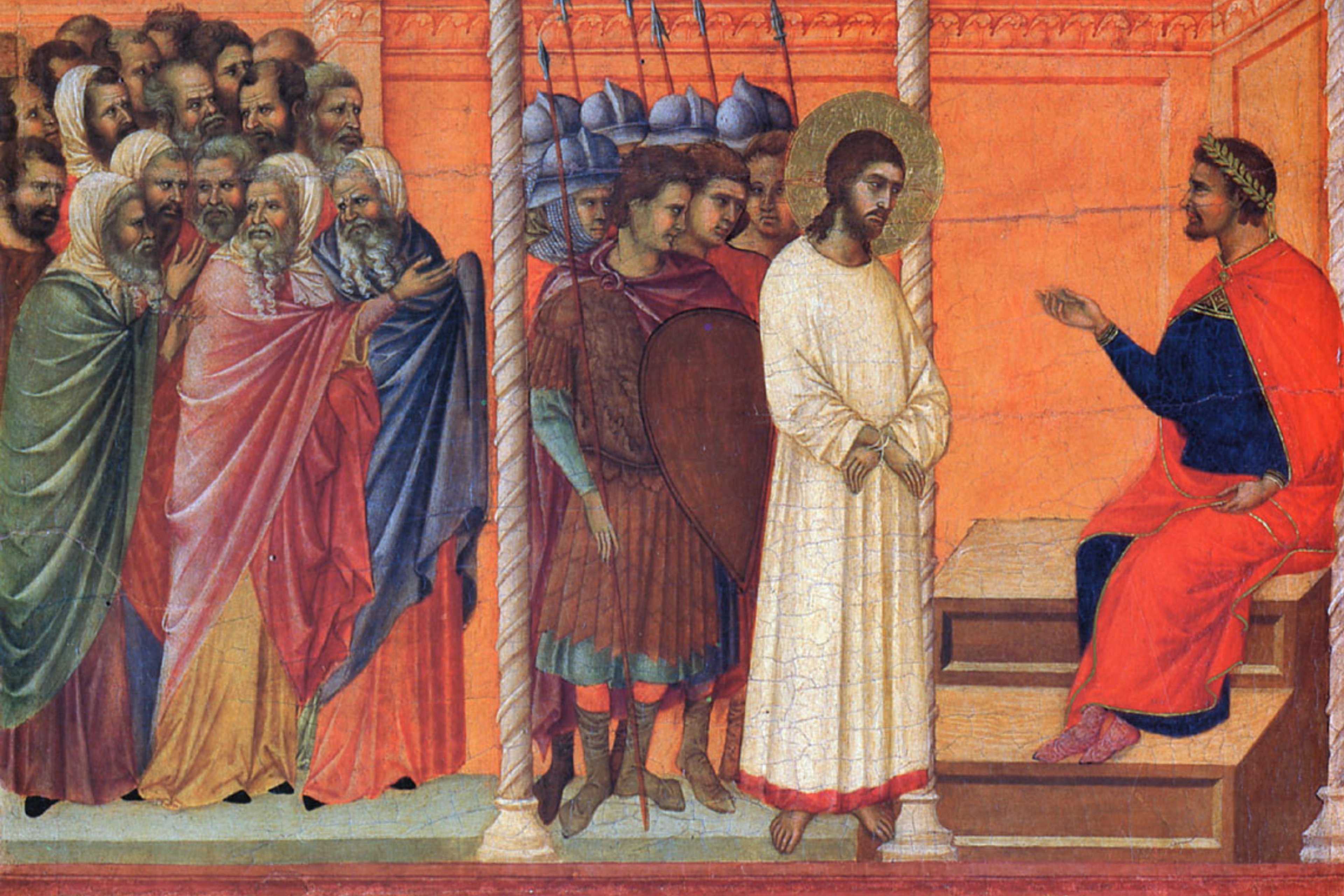The following blog is a reflection on John 18:12-19. The Scripture is included for reference.
John 18:12-19:11
Jesus Faces Annas and Caiaphas
So the band of soldiers and their captain and the officers of the Jews arrested Jesus and bound him. First they led him to Annas, for he was the father-in-law of Caiaphas, who was high priest that year. It was Caiaphas who had advised the Jews that it would be expedient that one man should die for the people.
Peter Denies Jesus
Simon Peter followed Jesus, and so did another disciple. Since that disciple was known to the high priest, he entered with Jesus into the courtyard of the high priest, but Peter stood outside at the door. So the other disciple, who was known to the high priest, went out and spoke to the servant girl who kept watch at the door, and brought Peter in. The servant girl at the door said to Peter, “You also are not one of this man’s disciples, are you?” He said, “I am not.” Now the servants and officers had made a charcoal fire, because it was cold, and they were standing and warming themselves. Peter also was with them, standing and warming himself.
The High Priest Questions Jesus
The high priest then questioned Jesus about his disciples and his teaching. Jesus answered him, “I have spoken openly to the world. I have always taught in synagogues and in the temple, where all Jews come together. I have said nothing in secret. Why do you ask me? Ask those who have heard me what I said to them; they know what I said.” When he had said these things, one of the officers standing by struck Jesus with his hand, saying, “Is that how you answer the high priest?” Jesus answered him, “If what I said is wrong, bear witness about the wrong; but if what I said is right, why do you strike me?” Annas then sent him bound to Caiaphas the high priest.
Peter Denies Jesus Again
Now Simon Peter was standing and warming himself. So they said to him, “You also are not one of his disciples, are you?” He denied it and said, “I am not.” One of the servants of the high priest, a relative of the man whose ear Peter had cut off, asked, “Did I not see you in the garden with him?” Peter again denied it, and at once a rooster crowed.
Jesus Before Pilate
Then they led Jesus from the house of Caiaphas to the governor’s headquarters. It was early morning. They themselves did not enter the governor’s headquarters, so that they would not be defiled, but could eat the Passover. So Pilate went outside to them and said, “What accusation do you bring against this man?” They answered him, “If this man were not doing evil, we would not have delivered him over to you.” Pilate said to them, “Take him yourselves and judge him by your own law.” The Jews said to him, “It is not lawful for us to put anyone to death.” This was to fulfill the word that Jesus had spoken to show by what kind of death he was going to die.
My Kingdom Is Not of This World
So Pilate entered his headquarters again and called Jesus and said to him, “Are you the King of the Jews?” Jesus answered, “Do you say this of your own accord, or did others say it to you about me?” Pilate answered, “Am I a Jew? Your own nation and the chief priests have delivered you over to me. What have you done?” Jesus answered, “My kingdom is not of this world. If my kingdom were of this world, my servants would have been fighting, that I might not be delivered over to the Jews. But my kingdom is not from the world.” Then Pilate said to him, “So you are a king?” Jesus answered, “You say that I am a king. For this purpose I was born and for this purpose I have come into the world—to bear witness to the truth. Everyone who is of the truth listens to my voice.” Pilate said to him, “What is truth?”
After he had said this, he went back outside to the Jews and told them, “I find no guilt in him. But you have a custom that I should release one man for you at the Passover. So do you want me to release to you the King of the Jews?” They cried out again, “Not this man, but Barabbas!” Now Barabbas was a robber.
Jesus Delivered to Be Crucified
Then Pilate took Jesus and flogged him. And the soldiers twisted together a crown of thorns and put it on his head and arrayed him in a purple robe. They came up to him, saying, “Hail, King of the Jews!” and struck him with their hands. Pilate went out again and said to them, “See, I am bringing him out to you that you may know that I find no guilt in him.” So Jesus came out, wearing the crown of thorns and the purple robe. Pilate said to them, “Behold the man!” When the chief priests and the officers saw him, they cried out, “Crucify him, crucify him!” Pilate said to them, “Take him yourselves and crucify him, for I find no guilt in him.” The Jews answered him, “We have a law, and according to that law he ought to die because he has made himself the Son of God.” When Pilate heard this statement, he was even more afraid. He entered his headquarters again and said to Jesus, “Where are you from?” But Jesus gave him no answer. So Pilate said to him, “You will not speak to me? Do you not know that I have authority to release you and authority to crucify you?” Jesus answered him, “You would have no authority over me at all unless it had been given you from above. Therefore he who delivered me over to you has the greater sin.”
Reflection
In John’s gospel a hearing before the high priest and his council would be superfluous, for the decision had already been taken to get rid of Jesus after Caiaphas had gathered his council as a reaction to raising Lazarus from the dead. There the high priest prophesied unknowingly, ‘Better that one man should die for the people’. Instead, Jesus stands before Annas, father-in-law of Caiaphas. It is not clear who is interviewing whom, for Jesus proclaims his innocence and continues his open teaching, to which Annas can make no reply.
Then he is taken before Pilate, the judge who makes a fool of himself by asking, ‘What is truth?’, when Jesus has been teaching truth throughout the gospel. The scene is carefully articulated by John, alternating scenes outside in the courtyard and inside the praetorium. Jesus declares his kingship and his absolute power, while Pilate three times declares him innocent.
In mockery Jesus is robed and enthroned as king. Then Pilate brings him out, still robed in purple. With the Johannine ambiguity it could either mean Pilate sat down on the judgement-seat or Pilate sat Jesus down on the judgement-seat. So Jesus is enthroned as king and judge. Before this, the Jewish authorities betray themselves and their religion by crying out, ‘We have no king but Caesar’. If God is not king, Judaism falls to the ground. To reinforce the point Pilate insists on making a placard in the three world-languages, Hebrew, Greek and Latin, which reads ‘Jesus of Nazareth, King of the Jews’. It is the triumph of Jesus and the collapse of Temple Judaism.
To conclude the trial scene Pilate hands Jesus over to them to be crucified. This is the full declaration of Pilate’s failure as governor and judge: he gives no sentence and demonstrates that he is allowing the Jewish authorities to have their way despite his own triple declaration of Jesus’s innocence.
Question: Do I avoid responsibility and leave others to make mistakes?
 This reflection is extracted from A Year With the Bible: 365 Daily Reflections. Embark on the journey of salvation history by reading the Bible every day for a year. Filled with insightful commentaries by a top Scripture scholar, delve deeper into the Bible and understand God’s Word with this essential read.
This reflection is extracted from A Year With the Bible: 365 Daily Reflections. Embark on the journey of salvation history by reading the Bible every day for a year. Filled with insightful commentaries by a top Scripture scholar, delve deeper into the Bible and understand God’s Word with this essential read.
For more insights on Scripture, and to support the mission of CTS, order your copy of A Year With the Bible: 365 Daily Reflections.
